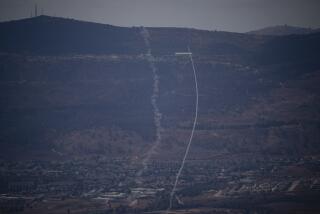Captives Are Terrorists, Israel Says : Mideast: Officials rebuff U.S. suggestions that they swap their 400 Arab internees for Western hostages.
JERUSALEM — Israeli officials expressed annoyance Monday with persistent suggestions from the United States that the key to more hostage releases in Lebanon is for Israel to free its own Arab captives.
The officials rejected insinuations that Israel’s prisoners are also hostages, rather than dangerous combatants. Comments from President Bush and U.S. senators have put Israel and hostage takers in Lebanon on a par by suggesting that all sides release their captives.
On Sunday, two senior U.S. senators, Daniel Patrick Moynihan (D-N.Y.) and Minority Leader Bob Dole (R-Kan.), urged Israel to free its Arab “hostages.”
“One thing we don’t relish, and that’s an understatement, is to place us and the hostage holders in the same pile,” Yosef Ben-Aharon, a senior aide to caretaker Prime Minister Yitzhak Shamir, said Monday. “It’s utterly without foundation.”
Ben-Aharon and other officials maintain that Israel holds no innocent civilians but rather “terrorists” directly responsible for attacks on targets inside Israel or in Lebanon within a buffer zone that it occupies along with a Lebanese client militia.
About 400 prisoners are jailed indefinitely inside the zone at a former French colonial fort called Khiam. A few captives are held in Israel, including Sheik Abdel Karim Obeid, a Shiite Muslim leader abducted from Lebanon last July by Israeli commandos. Obeid was meant to be used as a bargaining chip by Israel to trade for three of its own soldiers held by Hezbollah, the radical Shiite organization in Lebanon. Obeid is a middle-ranking Hezbollah official.
Hezbollah did not take the bait, and no trade took place.
“In any case,” Ben-Aharon argued, “we do not see Obeid as a hostage. This is no simple cleric. He is important in the chain of command of a terrorist organization.”
Israel has offered to exchange Obeid and captives held in Lebanon not only for its own missing soldiers but also for Western hostages. However, as a trickle of foreigners were released from Lebanon in the last few months, no word was heard of the Israelis. Two American captives, Robert Polhill and Frank H. Reed, were freed from Lebanon within days of each other last month.
Israeli officials continue to insist that the release of Obeid or any detainees in southern Lebanon will come only if its own missing soldiers--two infantrymen and an air navigator--are accounted for and sent home. If such a deal could be worked out, Israel is “certainly ready to take part,” the government said in a statement Monday.
Shamir’s spokesman, Avi Pazner, said in the statement: “Israel again declares its readiness to release Lebanese detainees it holds in exchange for the return of all its (Israeli) prisoners and those missing in action.”
In recent weeks, Israel has been unusually quiet about the hostage issue, in contrast to its media campaign after the seizure of Obeid. Press reports have been scant, suggesting possible censorship of reporting on behind-the-scenes dealings.
Because of the current political crisis in Israel, a deal that does not include the missing Israelis is an especially sensitive option, a government official said. Shamir is trying to assemble a new coalition government and stay in power. Any move to release significant numbers of Arab prisoners without getting the Israeli soldiers back might harm his chances, the official said.
The Israeli government has been under steady public pressure to bring home its missing soldiers, all of whom were captured in the mid-1980s. There are reports that two of them, Joseph Fink and Rahamim Alsheikh, are dead. Israeli officials knew that at least one, if not both, of the soldiers was injured when ambushed in 1986.
The navigator, Ron Arad, is believed to be alive and held by a Syrian-backed Shiite militia.
Another three soldiers who were captured in 1982 are said to be in Syrian hands, and Israel may also insist that they be freed if bargaining takes place.
Strain between Israel and the Bush Administration over hostage policy first surfaced during the Obeid incident. The Bush Administration viewed the abduction as ill-advised.
At the same time, Israeli officials chided Washington for timidity in its efforts to free U.S. hostages.
Israel has also come under fire for the treatment of prisoners in Khiam, which is guarded by the South Lebanon Army, the militia allied with Israel.
Amnesty International, the London-based human rights group, has reproached Israel about the lack of legal recourse for detainees and has published testimony about torture.
Among the prisoners in Khiam is a woman who was wounded in a 1989 assassination attempt on Maj. Gen. Antoine Lahad, who heads the South Lebanon Army. Another is a female interpreter for U.N. peacekeeping forces who was suspected of anti-Israeli activity.
More to Read
Sign up for Essential California
The most important California stories and recommendations in your inbox every morning.
You may occasionally receive promotional content from the Los Angeles Times.










